Would you like to tell us a bit about yourself?
My mother came to this country in 1947. She’s from a place called Sorrento which is near Naples in Italy, southern Italy, home of Diego Armando Maradona, the world’s greatest footballer.
She had married a British soldier by the name of Hewitt. They settled down in Croydon and they had two kids. Then, in ’52 my mother had a breakdown and she was put into a hospital which was in East Coulsdon. It was a horrible place, one of those huge Victorian buildings, you know? There were 100’s of patients in there, it was just horrendous.
She had an affair with someone in ’57 and I was born in ’58. After 2 days I was taken away from her and I was put into care. When I was 4 I was fostered by a family, but that didn’t work out at all, I was there for 6 years until I was 10, and then I was placed back in care.
First I went to a place called Woodrough in a place called Bramley, which is like a holding place, and then in August of 1968 I went to Burbank children’s home in Woking, Surrey.
I was very lucky because I wasn’t moved around. Burbank became my home, so at least I had some kind of stability, and I was there until 1976.
Then I decided I wanted to become a writer, but there were bylaws against people becoming writers in Woking so I had to move to London to achieve my aim.
“Then I decided I wanted to become a writer, but there were bylaws against people becoming writers in Woking so I had to move to London to achieve my aim”
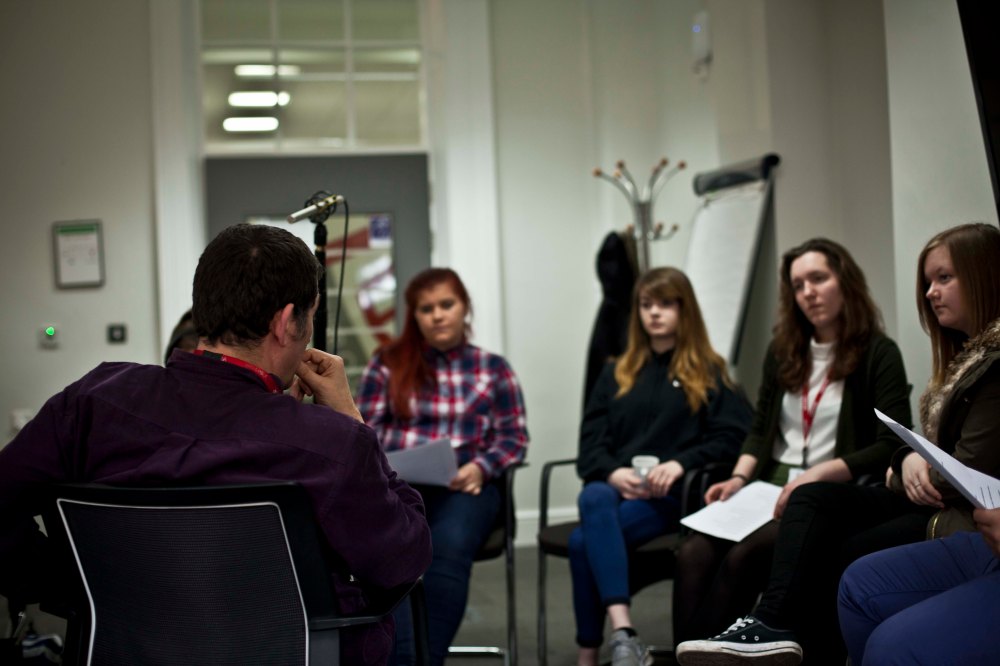
How did you feel about going into care?
How did I feel? That’s a good question.
Thing was I didn’t know anything about care when I went into care. When I knew about it, I was 10.
By then I was a big reader, and I’d read things like Oliver Twist by Charles Dickens, and so I kind of had a very a vague idea about orphanages or children’s homes but I didn’t really know anything about it, I didn’t know what was going on.
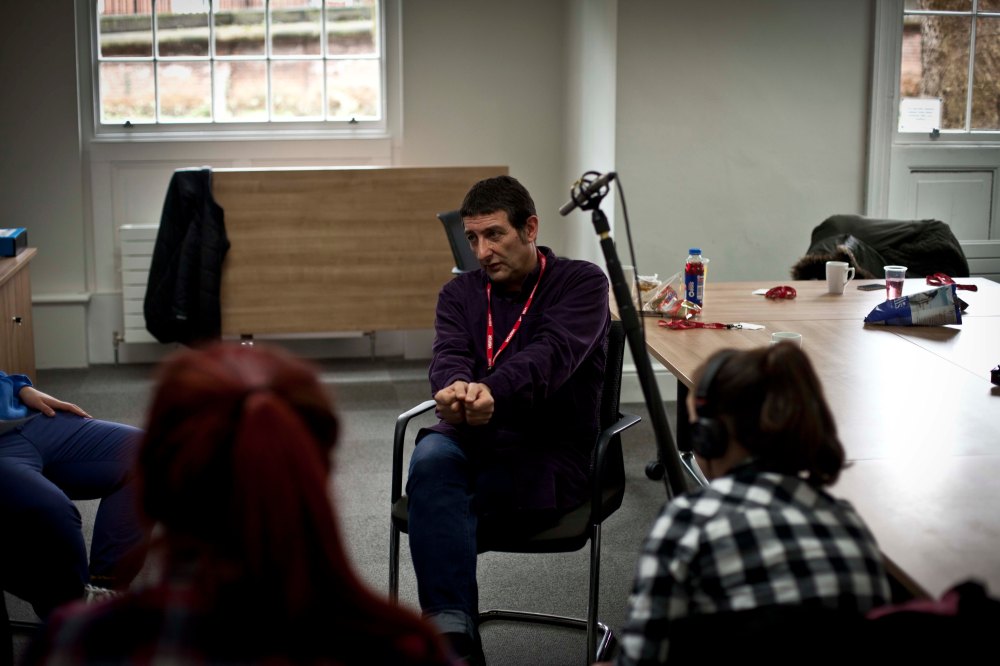
Basically what happened was my foster mother mum was very unstable and she was a very cruel and capricious women, capricious meaning you never knew what her moods were! You know, she might be happy one minute and then turn on you the next. She was a very cruel women as well, she would lock me in the room, I had eczema and she’d tie my hands together so I wouldn’t scratch through the night and stuff like that.
I was glad to get out of there.
Anyway what happened was one Friday my class at school were going swimming after lessons had finished, and I said “can I go swimming?” and she said “no” and I just thought this was really unfair, why cant I go swimming? You know I wasn’t asking to go to London to spend the weekend in Soho, I just wanted to go swimming, you know?
But I went, and of course she discovered my little adventure. The Saturday, I remember her making a phone call. We had a phone in our house, but it never rang! This is 1968, phones weren’t really… if the phone rang it was a special occasion, you know “Whose that?” so her making a phone call was important and I thought something’s going on here.
Then on the Sunday I was sitting in the kitchen it was about 4 o’clock in the afternoon and this car pulled up on the drive and she went “come with me” and she just opened the door and my suitcases were out and she just said “Go!”
So I was just put in this car and I didn’t know where I was going, I didn’t know what was going on.
“So I was just put in this car and I didn’t know where I was going, I didn’t know what was going on”
I write about this is in The Looked After Kid. When I got to this home, I met the guy who was in charge of it. A lovely, lovely guy by the name of John Brown. I was getting washed and he was asking me why i was there, but I didn’t really know why I was there.
I just remember this real feeling of ice and coldness coming up inside me, that I didn’t care anymore, you know “just Leave me alone” it was really weird, I always remember that.
And so I just knew I was in this children’s home and I didn’t know how I had got there, and so I had to kind of make it up as I went along.
It wasn’t like somebody said to me you’re going into care and I thought oh my God this is terrible, it just happened.
The thing about children’s homes – for me anyway, my experience – was that the kids kind of look after each other. The other kids there showed me the ropes as it were. I stayed at that children’s home from April to August, and to be honest with you I loved it. They were a lovely couple who ran that home John and Molly Brown, they were really good people and they kind of took a shine to me.
I sat in a tree for the first 2 days, I didn’t know what to do, I just sat in this tree, and then one day John Brown said to me “come and watch some cricket”, I could watch tv, at lunchtime! I wasn’t even allowed to watch tv at my foster mums but to be able to watch it at lunchtime!
So he was just really trying to be nice to me.
I went to Burbank in August 1978. Burbank was alright, once I got into the rhythm of it, once I got settled I was okay with it.
“Burbank was alright, once I got into the rhythm of it, once I got settled I was okay with it”
I had to make it up as I went along I didn’t really feel anything at the time, it’s just as it went on that I started feeling things.
One of the things I felt, and I don’t know if it was a defence mechanism, and I don’t know if you feel the same way, but I kind of liked it. I liked being the odd one out at school. Everybody had parents and I didn’t and that kind of made me feel a bit special.
I think it was me trying to turn a bad situation into a good one.
“I think it was me trying to turn a bad situation into a good one”
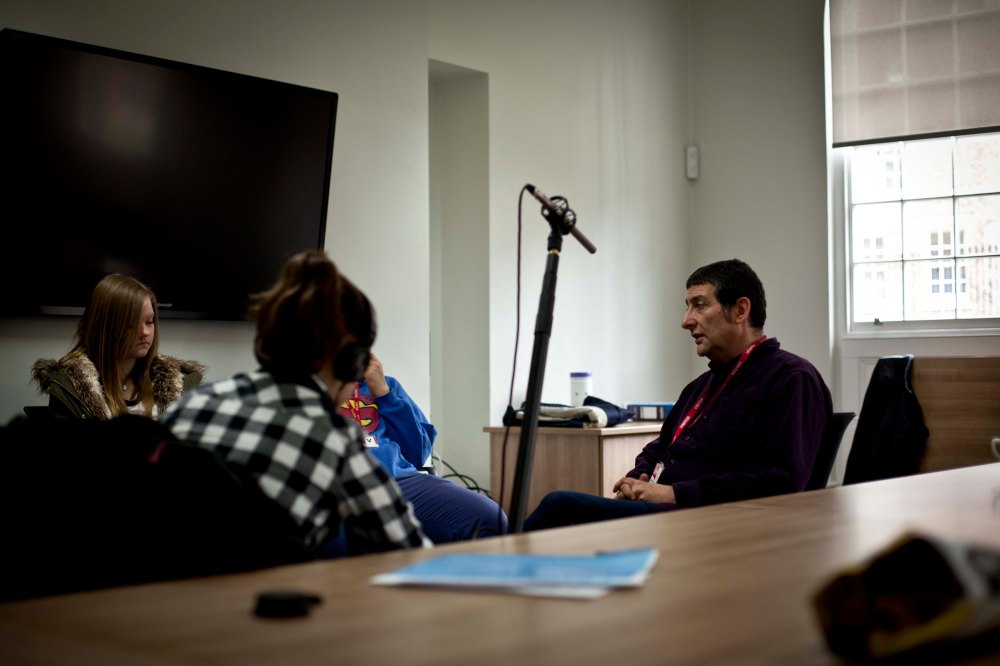 What is your favourite childhood memory?
What is your favourite childhood memory?
My foster mother went away to India for 6 months, she had a job with She Magazine and she went away for 6 months. Suddenly a whole cloud lifted. I cant tell you how cruel this women was. She had a bad childhood herself and she was adopting and fostering kids to take out her unhappiness and anger on them, which included me.
So she went away for 6 months and her mother (and the mother of her husband, Bill), came to live at the house. It was the best 6 months. No one was shouting at me, no one was criticising me, no one was hitting me – it was just how it should be.
I remember lying in the garden once looking up at the sky and all the clouds and just feeling great. It was just lovely, that’s my favourite childhood memory. Oh and Spurs winning the cup in 1967 (laughter).
“I remember lying in the garden once looking up at the sky and all the clouds and just feeling great”
What is your biggest achievement?
Well I suppose writing 21 books isn’t bad! I’ve just recently had a baby boy, 6 month old baby boy, that is up there as well. I think coming to terms with what happened in my childhood.
“I think coming to terms with what happened in my childhood”
When I was 13,14,15 I was quite depressed, especially in my 20s. You see I had moved to London by then and I remember, it was 1983 and it was summer, it was a really nice summer and I had just had my first book published. I was working for the NME which is what I wanted to do since I was 14! I was seeing a very beautiful girl and I remember a mate of mine saying to me “your life must be amazing” but it wasn’t. I just felt empty. I just felt really empty. Because all those things are external and they don’t kind of fix you. But I think coming to terms with what happened and trying to deal with that has been good, the birth of my son and writing books, achieving what I wanted to do.
Overall what do you think your care experience has been like?
When I was in care, it was a whole load of different emotions. I think one of the problems about care is that people look at it it in a very one-dimensional way, oh it’s a children’s home it’s a bad thing. But my experience was that I met some amazing people, made some great friends – friends that I have got to this day. When I left care I was 18 and I went to live with this friend of mine Pete Garland up in Bisley, I lived up there for about a year and a half. And like I say I wanted to be a writer and I thought that isn’t going to happen in Woking, I need to get to London. So I enrolled at a college called North London Polytechnic.
The great thing about London is you can reinvent yourself; you can be who you want to be there. I wouldn’t talk about my past, I was just fixated on books and music and football. The children’s home was behind me, I just didn’t want to know about it – it was like this monster.
“The great thing about London is you can reinvent yourself; you can be who you want to be there”
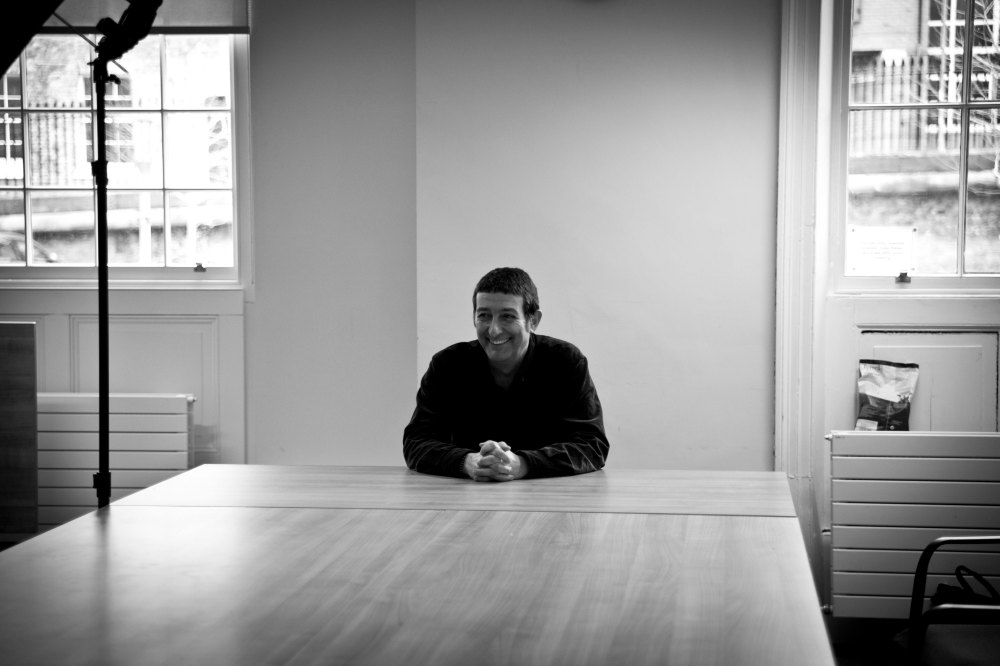
Anyway As you get older you tend to find you want to… whether its good or bad, to kind of re-engage with your past. So in 1997 I went back to the home. I was really really fearful, I went back to look around, I went with Sahika who is now my wife, and I just laughed man. I also went with my friend of mine Dez, who was my best friend at Burbank and it was just really good memories. I just remembered the kids I grew up with, and a lot of fun. I’d be like “that’s the room I did this in”, and “that’s the room where that happened”, and “there’s the boiler room” and remember Frank Vickery and Jimmy Boylen and all these great sort of memories came flooding back. It was then I thought, this care thing – its much more complicated than the misconception that all children’s homes are bad.
One of the things I tried to do in both the books I wrote, was to say there are other levels to it. For example I realised that there was this bond between all of us kids there.
You know like when your 11, 12 you don’t want to hang out with the 7, 8 year olds, you want to hang around with kids your own age or in my case with the older guys who were 15, 16 down the boiler room, you know all that kind of caper.
But all those kids they were my little brothers and sisters as well, I realised that Freddy Purvis and Esther Purvis who were 7 and 8, were just a much a part of it as the people I was hanging out with.
I just felt my care thing was very positive and I think just on a practical level, the fact that I wanted to be a writer and to go to London and do it, because of what happened to…
I remember standing in the boiler room with Frank Vickery, and he said to me “It doesn’t get any worse than this” and even though I didn’t think about of it at the time I think that kind of instilled in me a I can do what I like attitude, because whatever happens it aint’ going to be as bad as that, do you know what I mean? It gave me courage, it gave me the courage to get on that train, go to London and do what I did. I am a great believer in trying to turn bad things into good, you can always do it, whatever bad has happened there’s always a way you can try and use that in some way to achieve things, and that’s what I learned.
“it gave me the courage to get on that train, go to London and do what I did”
Even though part of my care experience was bad, you know there were staff members who were complete and utter mamalukes, as they say in Napoli, and so there was some bad stuff, but there was a lot of really good stuff as well, I learnt about loyalty.
One of the things as well that happened, I don’t know if you have the same thing, we never asked each other why we were there. We never sat down and said why you here?
We just all recognised in each other that we were here and we had to get on with it. That really helped me in terms of accepting anybody, no matter what creed, colour, I just accepted everybody, if they came to the home they were one of us. That’s a good thing to take in to later life, I never judged anyone, I don’t really judge people so I feel a lot of good came out of it.
Gaining that individuality gave me that separateness, feeling I’m apart from this, and it helped me as a writer because as a writer you have to stand on the outside and look in, you can’t really join in. So I was always standing on the outside looking at things and that really helped me when it came to writing because I could get a distance from it.
With The Looked After Kid, my first book, a friend of mine said you should write about this stuff and I said I’m not ready yet, because I had to get distance, you have to get distance and being in a children’s home taught me that. So there was a lot of good stuff about being in care.
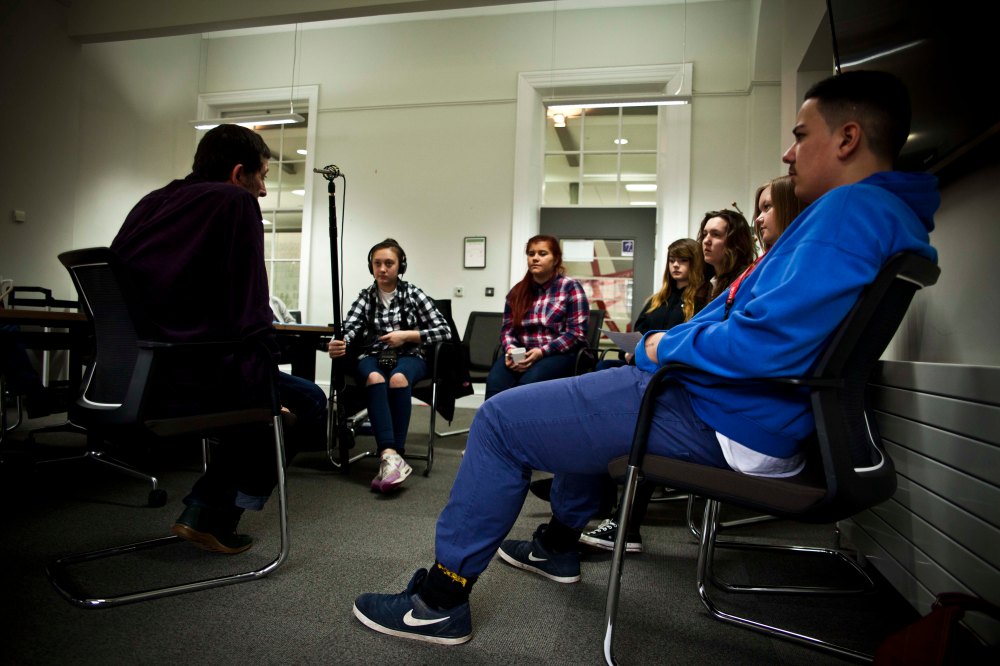
What has driven you?
I was kind of lucky. When I was 14 I was at school, and the things I loved the most were things that kept me in the present. Therefore books, because when you read a book you are just there with the book, music, getting transported by music, getting transported by words, and playing football, because when your playing football your not thinking about where you are you’re just playing a game of football.
Those 3 things placed me in the present. I had music and books and I was obsessed with them because they took me out of where I was at, especially at the foster parents. The only good thing she ever did for me was to teach me to read at an early age. I was reading Greek mythology when I was 6 or 7 or something crazy.
“I had music and books and I was obsessed with them”
At school, it doesn’t happen now but at school kids used to come in with albums under their sleeves , you know the new David Bowie, I used to come in with books.
Books I was never going to read, it was just to show you know I am intelligent I am, (laughter) these teachers going (does high pitch voice) “Oh your reading Socrates” (laughter).
But what drove me, was that I went into school one day and Enzo Esposito was reading this newspaper and I said “What’s that?” and he said, “it’s the new musical express” and I said “what the hell’s that?” and he said “it’s a music paper”, and I said “what’s a music paper” and he said “it’s a paper about music about bands and they interview people” and I read it – and a light bulb went on. I thought that’s exactly what I want to do – its music and words brought together.
“I read it – and a light bulb went on. I thought that’s exactly what I want to do – its music and words brought together”
So I knew from that day onwards that was what I was going to try and do. Everything was geared towards that, I read NME religiously every week I’d be buying loads of books about music. I just had my nose in a book the whole time and listening to music and keeping up with it. Then when I was a bit older, going to Guildford to watch bands.
I just dreamed about doing it, I was very, very lucky like that. I got the obsession at an early age. I really do believe if you put your mind to it and you’re constantly hammering away at, it a door will open because its force of will.
There really is something about that. That if you’re obsessed enough you can do it, so that’s what drove me this idea of being a writer for the NME.
Funny thing was, when I joined the NME when I was 24 or something, I remember my first day at the office sitting at this desk thinking is this all there is, is this it? It didn’t really compute to me – it’s only when I look back on it, I think yeah, boy done good.
Yeah with the writing thing your constantly trying to better yourself you are never satisfied, I could show you bits of all of my books that I would love to re write a books never finished, your always wanting to make it better. A book is never finished.
I do readings, and I am reading and I’m a fast reader right, and I can see like four lines ahead a sentence I think “oh god that’s rubbish” (laughter) so ill make one up on the spot, so that drives you as well because you want to write the perfect book but you cant but you keep on doing it.
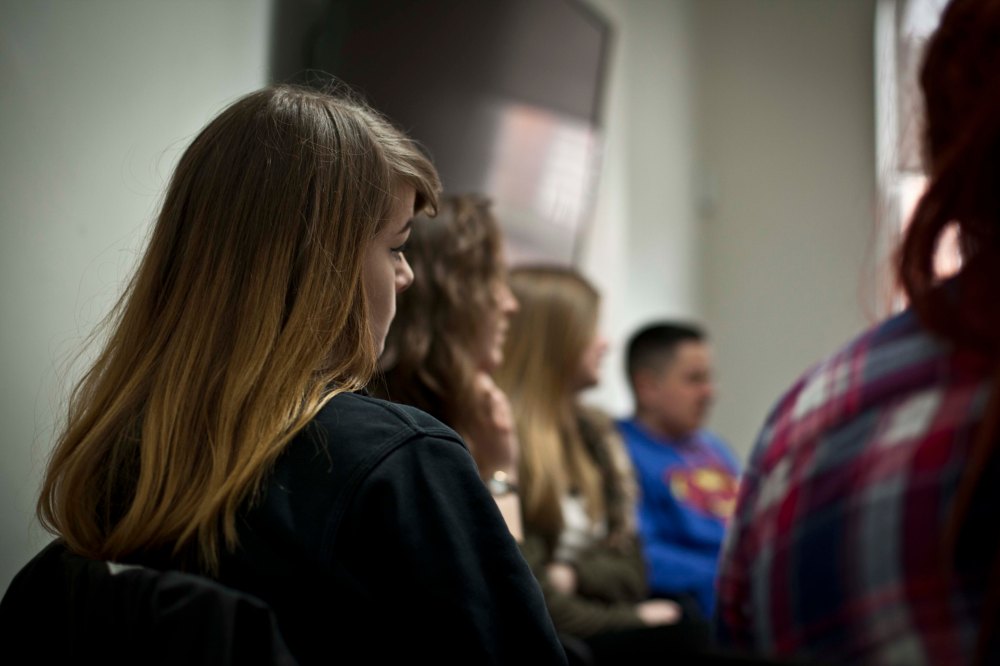
Who is your role model?
Robert De Niro because of His work ethic. In the early days, he’s an actor who becomes his characters. For example he played a boxer called Jake LaMotta in probably his best film Raging Bull and he lived with LaMotta for a year and he trained with him and he completely immersed himself in his work, and that’s what really inspired me to immerse myself in mine.
Have you ever felt like giving up?
Yeah. A few times yeah. there’s some days I’ve thought oh god why couldn’t I have just gone and worked in an insurance office in Woking and had the 9 to 5 (laughter) but then I think nah, I was never built for that.
There’s other times like when you put a book out people write about it and you get criticised it and it can really be….
I did this book on Oasis in ’96 or ’97. Let’s say it got 50 reviews, 49 reviews said this amazing what an amazing book. 1 review said this is rubbish… what’s the one review I remember? That one yeah. And you think sod it, what’s the point? You have moments like that, but I think that’s a human condition I don’t think that’s pertinent to just kids in care. I think all of us at some point in life ask what’s the point in all of this? But then you wake up the next day and think stop being stupid and carry on and push on.
How much do you think care has changed?
Loads man, loads. it’s unbelievable, you don’t know how good you’ve got it (laughter). After The Looked After Kid came out I went up to this children’s home in Birmingham to do a reading and I did the opening part, and the opening part of the book is me waking up in this bedroom. So we shared this bedroom, there were 8 of us in this bedroom, right. I go and wash my face and Mothy Ryan comes up to me and tells me he’s “going to kick my head in”.
I go back and put on my school uniform, and I hate my clothes because they are all cheap and they have holes there because I’ve been playing football and falling over, and all my mates have got these really nice shirts, buttoned down, and I’ve got this horrible nylon shirt.
“I go back and put on my school uniform, and I hate my clothes because they are all cheap and they have holes there because I’ve been playing football and falling over, and all my mates have got these really nice shirts, buttoned down, and I’ve got this horrible nylon shirt”
I go down to breakfast and it’s this horrible food and I’ve got no money, and then I’m walking to school thinking about Teresa Driver, who I am madly in love with at the time but I cant ask her out because I’ve got to be in by 9 o’clock, and she doesn’t even go out until 9 o’clock (laughter).
So I read all this and this girl their said “man your old school”, so I said “what do you mean?” And she said “we’ve got our own room, we get £40 a week, we come and go when we want we like, we get the clothes we want…”
When I went back to Burbank for example, the bedroom where there were 8 of us, just one kid, and he’s got a nice bed and a TV and an alarm clock and you know, it’s changed for the better, materially.
My children’s home there were 25 of us in there. Seems to me there’s been a move away from that and they are much smaller units. I went to one in Norwich, it was just like a house, you know with 3 or 4 kids and 2 staff members, and obviously that’s much better.
The reason I called my book The Looked After Kid, was because we were looked after, we had a roof over our heads and we were given food and clothes, but we weren’t looked after in terms of care and affection, or trying to work out problems we might have and so on, and I don’t blame the staff really. You know they had 25 kids to get them up get them to school, get them back, get them fed and get them to bed. So I think care has changed a lot for the better and the more of it the better as far as I am concerned. I think more of that one on one stuff that you get…
…One of the big problems I have had in life is…
For example I would make friends with someone in the home, right, Jimmy Boylen for example, I was really good friends with him; I remember coming home one day and I asked “where’s Jimmy?” and it was “Oh he’s gone” and he would be gone. Or I would get close to a staff member and then they would leave, so there was no consistency. So that effects you later in life and in your later relationships because you don’t really trust people, you think they are going to go away at any point, you know disappear. It’s like StarTrek, you know, they kind of got beamed up, voom gone (laughter).
“I remember coming home one day and I asked “where’s Jimmy?” and it was “Oh he’s gone” and he would be gone”
So it is better where it’s a more stable environment and staff stick around.
Do you think you were ever judged or labeled because you were in care?
Yes I was. I got interviewed by this lady from The Times who afterwards told me that she would never let her daughter sit next to anyone in class who was from a children’s home, because she felt that kids from children’s home were these wild feral creature’s, so you get that.
Then on the other side you get the sympathy vote which I always really fought against, because when I moved to London I wanted to just be judged on my writing, I didn’t want people to go “oh he’s from a children’s home let him”…
I was paranoid about that. I remember when I joined the NME I was convinced that they had this huge computer, you know, and someone had put my name in and found out I was in a children’s home and that’s why I got the job. I didn’t want that sympathy thing, if I had talent I had talent, if I didn’t I didn’t. That’s what I wanted to be judged on.
I still think there’s still a huge thing against kids in care. The trouble with children’s homes is….
My children’s home was hidden away. I was in this town called Woking, so you have got the football club, the bingo halls, you’ve got the pubs, they are visible, people know how they operate… but people still don’t know about children’s homes.
They are very negative images on TV, you know child abuse, homeless kids, all that, it’s just associated with negative energy and negative imagery, and people just don’t want to know, you know ‘hide it away over there’.
I mean all the children’s home’s I have ever known have all been hidden away, there was all trees around them, they’re not visible, and I understand it – I understand why people have those images or thoughts about children’s homes, but that’s one of the things that needs to be broken down really. And also this idea that somehow it’s our fault. It wasn’t my fault what happened to me, do you know what I mean?
What happened to me was unfortunate but it wasn’t my fault. There are people out there that think, oh they are in care, somehow its their fault that they are there and that is really wrong.
“What happened to me was unfortunate but it wasn’t my fault. There are people out there that think, oh they are in care, somehow its their fault that they are there and that is really wrong”
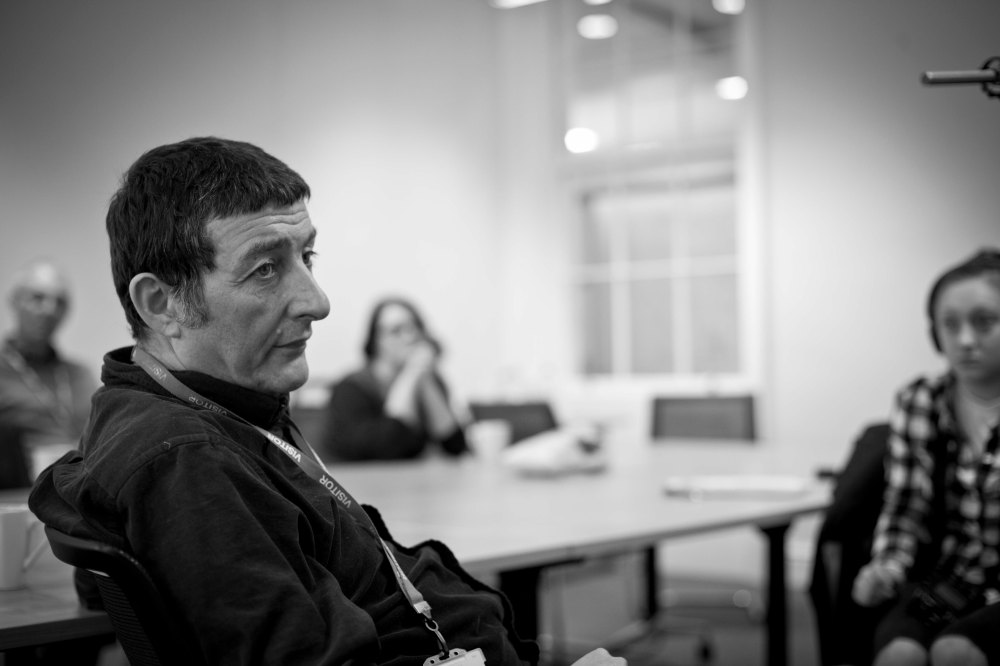
When and what moment do you think you really started to believe in yourself?
Early 30’s. I had really low self-esteem all through my 20’s. But after about the 10,000th person said you’re a really great writer, I thought you know what you might be right here, because they kept telling me this.
I tried counselling once, about this low self esteem but it didn’t work out. But I did read this thing once about positive thinking. It really helped me. It was basically saying that you spend your life telling yourself your rubbish, and self loathing and all that, but where’s it got you? Why don’t you get up everyday and say to yourself you’re a wonderful writer and human being, what’s the difference? You might as well do it. So I started doing it, and that coupled with the fact 10,000 people telling you you’re a great writer made me feel you know what, you’re not bad at what you do.
Now I am very secure in where I am at in life. I’ve written books which are great, not all of them, but you know there’s some really good work there and I am very proud of that. It took a long time, but just that idea of instead of whipping yourself, start loving yourself, because once you start doing that you’re on your way, you really are.
“just that idea of instead of whipping yourself, start loving yourself, because once you start doing that you’re on your way, you really are”
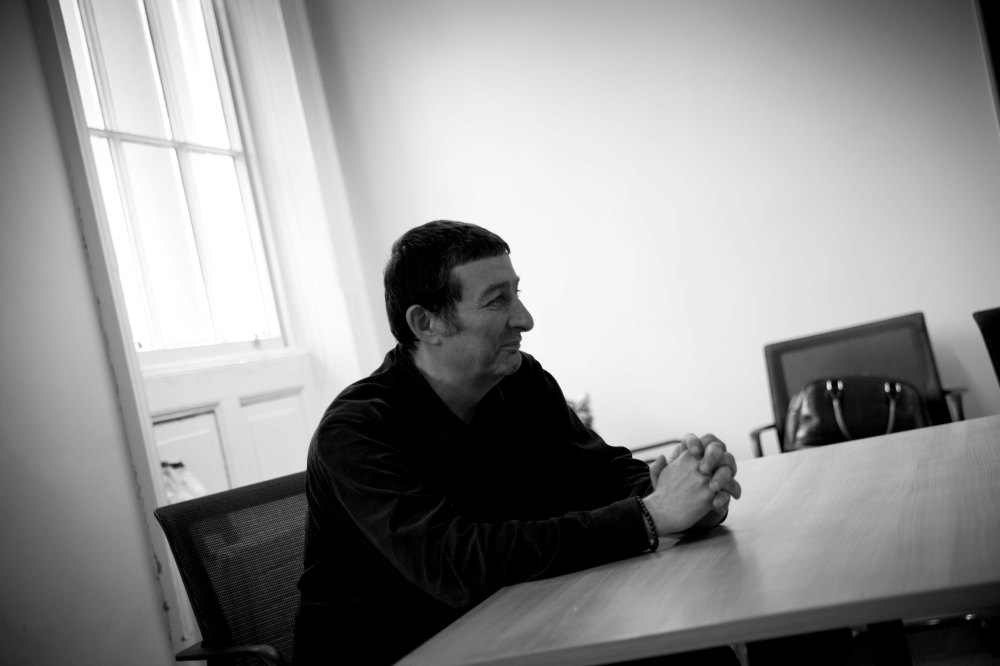 Did you ever feel alone?
Did you ever feel alone?
Yeah. Oh all the time. Especially at the foster mothers, because I was locked in a bedroom and I was on my own in there. I’ve always been a bit of a loner really I suppose, but it’s got better as the years have gone on, but especially my childhood I was very alone. But I didn’t know I was alone. Because when you’re a child you just think that’s normal. Actually with her, I did think what she was up to wasn’t normal.
Writing is a lonely profession, it’s not like your working in a team, you work on your own. You sit there writing and spend hours and hours thinking is this any good, and you like it but you think will anyone else? Again just trying to turn it to your advantage, doing a job you love, that’s what I did.
Do you think the staff at Burbank helped you and if so how?
There was one woman called Val, she was a bit of a bohemian, she had all these records and she taught me that it was alright to fail, because I had been brought up with this mad foster mum right, and the foster mum kinda wanted me to go to Oxford or Eton you know, trying to put me into this hole and so for years and years you had to succeed in all these…. and if you didn’t succeed you would die you know…
Val taught me that if I was happy and I wanted to be a road sweeper, if it made me happy, that was ok as long as you were happy. She showed me another side to life. She was great. She opened up a new world to me.
“Val taught me that if I was happy and I wanted to be a road sweeper, if it made me happy, that was ok as long as you were happy. She showed me another side to life. She was great. She opened up a new world to me”
They all tried in their own way, but Val was special. I give her the award.
What would you say to children in care?
What did my social worker say? If you’re dealt a lemon make lemonade!
What was it like when you first went into care?
It was confusing. I didn’t know what to do. I remember I just laid in this bed for hours. This girl, Bronwyn Carter came in, she said “What you doing?” and said “I don’t know” I didn’t know what to do, I wasn’t in the rhythm. I didn’t know you got up at this time and did this at this time, and you did that at that time and then you went to bed. I didn’t know any of that, so when I first went into care I didn’t know what to do. It’s like going to a new school, you are a bit all over the shop aren’t you. It was sort of like that. I got into it.
The record shop down the road, every month, the records they didn’t sell they would bring them down to the children’s home and it was this really wide selection, Fiddler On The Roof and the Dubliners, you know this mad sort of range of music and so I got to listen to a lot of music and it made me happy.
If you can change anything about your past what would you change and why?
I wouldn’t change anything; I wouldn’t be where I am now.
In the most difficult moments what kept you going?
Music, books, I cant emphasise enough how much I got from those two things. When I was five years old I heard She Loves You by The Beatles, I still remember now, I was in heaven, I spent the whole day singing that song, I remember walking through a field singing that song and I just, music took me out of everything, it still does now, I hear a great record, and same with books, takes me to a different world. The fact that now I can write the book and give people the same experience, that’s an amazing thing, I’m very humbled by that.
“The fact that now I can write the book and give people the same experience, that’s an amazing thing, I’m very humbled by that”
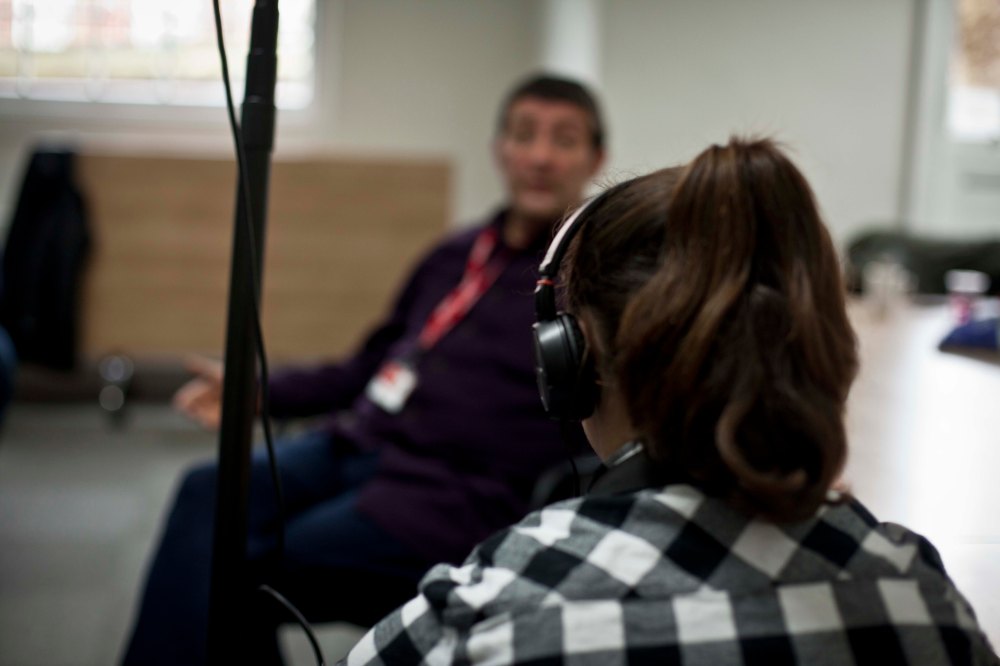
How did it feel proving to people wrong, that you could get a proper life?
(Laughter) There’s only one person I ever wanted to prove wrong. My English teacher Mrs. Woodhead, she had me behind after class, and said to me “your grades are slipping, O Levels are coming up, what do you want to do with your life?” and I said “I want to be a writer” and she laughed in my face. It really crucified me, I was so hurt, really really hurt. She kind of killed my dream. Anyway, I was there at the when I joined the school it was in it’s very first year, and it was having its 30th year anniversary and by then I had reconciled at lot of things. I wanted to go and bring her all my books and put them on her desk, saying “one two three four five six” (laughter) and remind her of what she said. I don’t think any teacher should crush a kid’s dream, even if they want to fly to the moon, they should encourage it. I always remember how she made me feel, you should never do that. I don’t care how mad the dream is, it should always be encouraged, especially for kids in care.
“I don’t think any teacher should crush a kid’s dream”
Did you ever run away?
I ran away twice from the foster mum, the first time, I just couldn’t take the cruelty anymore. I ran away and I was walking round and through all these fields and then it came to night and I didn’t know what to do, I was only about 8. So I saw this garage and I hid in this garage, and this man came in and found me and took me into his house, and his wife was there. And they said, “what are you doing?” I said, “I’ve run away from home” and I just couldn’t… I didn’t have the vocabulary to explain what was going on, that I was getting beaten up, caned… I couldn’t tell them, I just blurted out “she makes me do my homework” and he just thought I was a naughty little kid and he sent me back.
I couldn’t tell adults what was going on. I would sit there with a social worker who would come and visit me, and he would say “how are you?” And I would say “I’m really good”. You know or “How is school?” and I would say “yeah really good”, and then he would go talk to my foster mum for 2 hours.
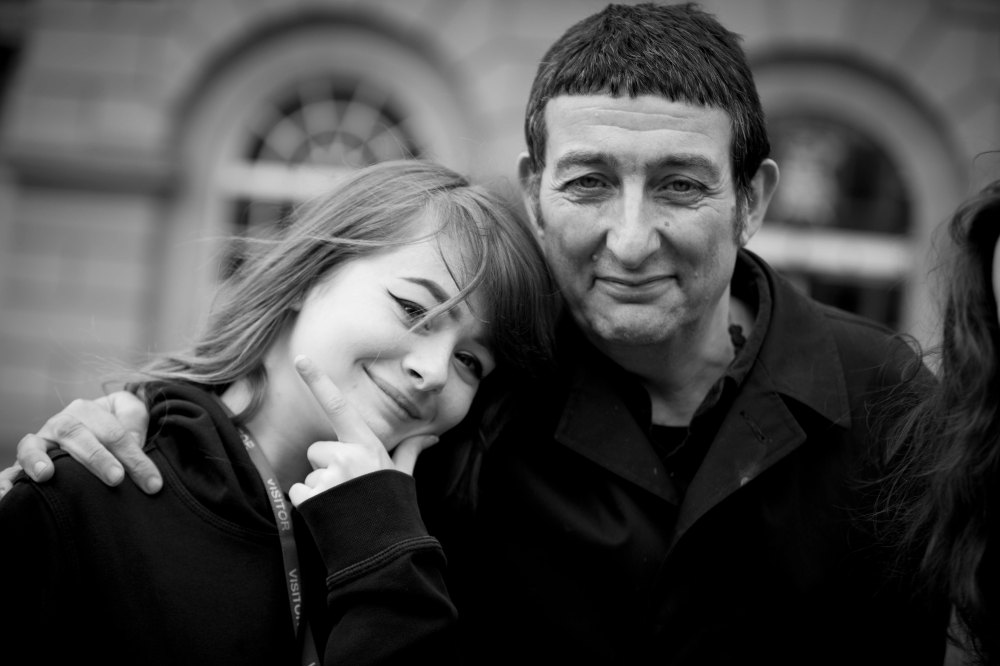 What do you think about the care system now?
What do you think about the care system now?
It’s a lot better but there’s a lot more work to be done. The expected exam results for a kid leaving care is one GCSE, it’s mad, I think it’s terrible. There’s one statistic to say that in London 60% of the homeless are form care backgrounds. I don’t give money to charity I give to kids on the streets, because I know that 1 in 6 is a care leaver.
“I don’t give money to charity I give to kids on the streets, because I know that 1 in 6 is a care leaver”
What did you do differently to the people around you?
I was just the lucky one. I was into music and books. But a lot of them did really well, I did a another book called But We All Shine On, I found four other guys I was in the home with and found out about what had happened in their lives and how they turned out. One was running a heating engineering company earning £100 grand a year , one was working with kids in hospitals and was really happy, another one had found God and was even happier, and one was writing TV scripts and doing really well. And a lot of the kids who came out of the home did really well, they came out of it good. I called the book But We All Shine On just to emphasise that fact. I wasn’t the only one who did well; there were loads of others.
“a lot of the kids who came out of the home did really well, they came out of it good. I called the book we all shine on just to emphasise that fact. I wasn’t the only one who did well; there were loads of others”
It’s really funny, I had this mate called Martin, we shared a bedroom and he was obsessed with money. And he was like “the only way forward is money” and I was like “no the only way forward is books and music”. He said “no, money” and we had these rows all the time, art verses money, right. So I said right okay Martin, in 20 years time we are going to sit down in the pub and find out who won. I was going art and he was going money. And 20 years later we did it, we met and I said “right how did you get on?” He said “I made loads of money, but” he said “you know what, I would love to write a book”. And I said, “really? I have written loads of books but i would love to make some money!” (laughter)
What challenges did you face in life, and how did you overcome them?
In the second book But We All Shine On, what I was trying to say was the human spirit is an amazing thing and even though life can really give you enormous kicks and punch you down there is something I think in all of us that makes us fight to get back up, especially kids in care, because we are used to it from an early age and it hardens you and makes us able to take blows that maybe others can’t. I believe in the human spirit, there’s something inside me that always said I’m not going to let this thing that happened to me ruin my life or dictate what’s going on.
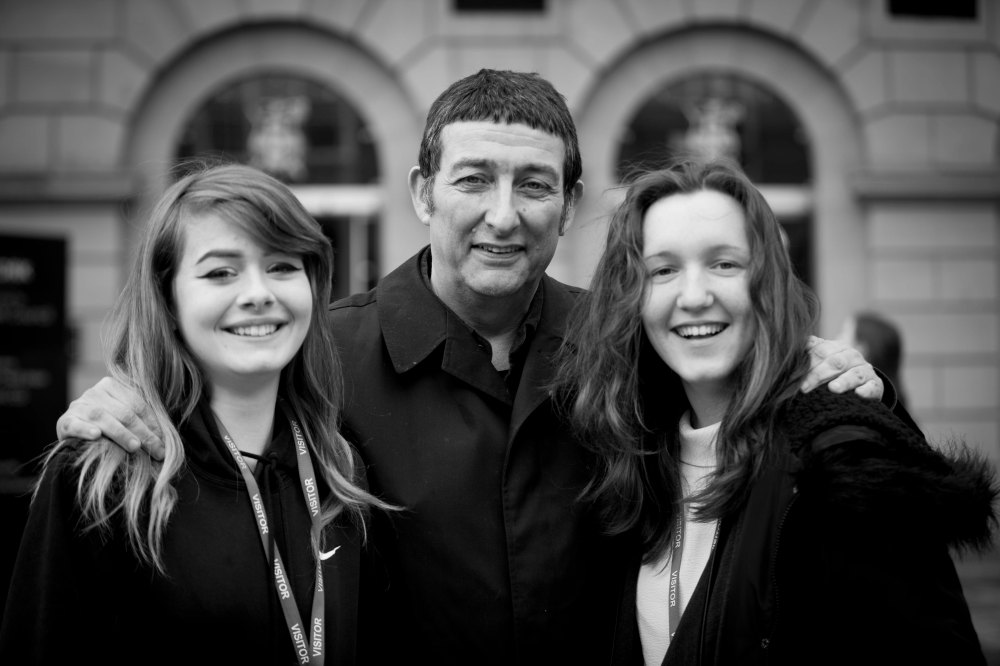 Who is the most inspirational person you have met?
Who is the most inspirational person you have met?
I never met him; can I have someone I didn’t meet? Nelson Mandela, for that man to spend 27 years in prison and come out and forgive the people who put him in prison. He’d learned their language, he knew he was going to rule South Africa. An inspirational figure, he was quite amazing.
I met Stevie Wonder, which was pretty cool. I met loads of people who were great and a lot of kids from the children’s home were amazing as well.
“I met Stevie Wonder, which was pretty cool. I met loads of people who were great, a lot of kids from the children’s home were amazing as well”
How do you become successful despite a care background?
I knew what I wanted to do when I was 14, if there is something you really want to do, and it can be anything, you focus on it, you put your mind on it. You think, that’s what I’m going to do. I don’t care what he says she says, they say, I am going to go and do that. I’m going to put all my energy into doing that and I going to achieve it, and if you can do that no one is going to stop you! It might take you 10 minutes, it might take 10 years, but if you knock on the door long enough it always opens.
“if you knock on the door long enough it always opens”
What is your message to professionals and foster parent?
Listen to the children. The Looked After Kid and But We All Shine – especially The Looked After Kid, the amount of social workers who came up to me at readings and said “if only I had this book when I was training”. I think the more information they get from kids in care, care leavers, it can only make them better because it makes them understand our way of thinking and to approach somehow what it is to be a kid in care and to act accordingly. I really feel for social workers, I really do. My social worker was amazing, she was fantastic she reunited my family! I still see her now. A really, really caring, loving woman and yet all you ever read about is when they mess up and it’s the front page of the Daily Mirror! They have a really bad deal social workers. Because I think they do a lot of good work and it never gets recognised. And there kind of seen as the enemy aren’t they? But I think a lot of them are really good people.
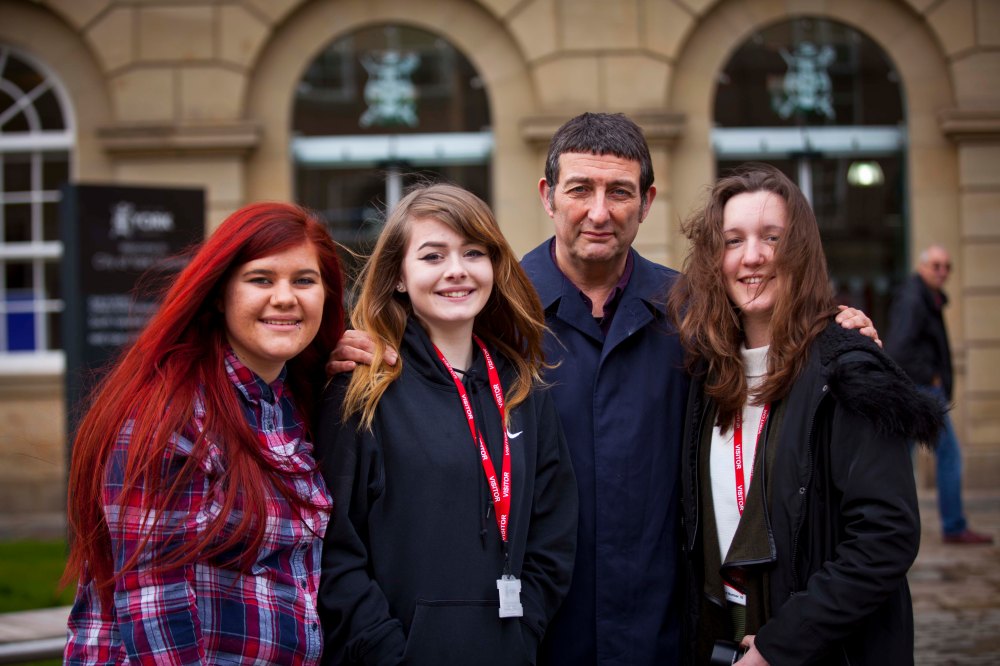
#aspiretomore
Feature image by Scott Akoz